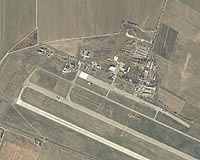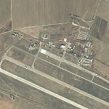
Russia to Open New Military Base in Kyrgyzstan
Publication: Eurasia Daily Monitor Volume: 6 Issue: 136
By:

Reports that the Kremlin plans to open another Russian military base in Kyrgyzstan have appeared over the past week. A delegation of Russian officials led by Deputy Prime Minister Igor Sechin and Russian Defense Minister Anatoly Serdyukov arrived in Bishkek to hold meetings behind closed doors with the Kyrgyz president Kurmanbek Bakiyev and the government. Despite the secrecy of these meetings, the news spread fast that Kyrgyzstan’s southern city of Osh might soon host the Russian military.
This comes only days after Bakiyev concluded a new agreement with the United States on the Manas base. In February Bakiyev had promised to expel the U.S. military from Kyrgyz territory after receiving a $2 billion loan from Russia, but he changed his mind late last month. His about-face embarrassed the Russian government. The second Russian base in Osh, therefore, seems more as a rebound to this disappointment. The possibility of opening this new facility was mostly packaged for the domestic audience in Russia.
Russian newspapers rushed to depict this development as the Kremlin’s geopolitical victory and stemming from the Kyrgyz regime striving to maintain friendly relations with Russia. In the meantime, the Kyrgyz government remained silent about the deal, while the U.S. reaction was neutral, accepting Kyrgyzstan’s right to choose its partners.
Military circles in Kyrgyzstan greeted the possibility of a new base with a mixed reaction. While most military officials have always been strongly pro-Russian and welcome any opportunity for further cooperation with Moscow, some question the added value of the potential second Russian base in Kyrgyzstan’s security. Former Defense Minister Ismail Isakov argued that the Kant base has failed to improve the capacity of the Kyrgyz army and another base is unlikely to change this trend (www.azattyk.kg, July 10). Instead, Kant is used in support of military drills organized by the Collective Security Treaty Organization (CSTO) in which Kyrgyz troops play only a minor role.
While the U.S. base in Manas actively serves the anti-terrorist mission in Afghanistan, the rationale underlying Kant has been more abstract. Indeed, both the Russian leadership and Kyrgyz government link Kant’s existence to the CIS, CSTO and the Shanghai Cooperation Organization (www.vz.ru, July 9). All three organizations have little impact on Kyrgyzstan’s security, and more military personnel are starting to realize this. However, regular CSTO meetings and military exercises create an illusion of a functioning organization.
This is the second occasion that Russia has initiated talks on a base in Osh. The first time it was mooted was in March 2005 (EDM, March 24, 2005). Kyrgyzstan was at that point preoccupied over the uncertainty surrounding whether the former President Askar Akayev would remain in power and if mass protests against his regime were being organized by the West. Furthermore, Bakiyev’s stance was unclear, as to whether he would pursue Western interests or follow a pro-Russian line.
According to Edil Baisalov, the Kyrgyz political activist, Bakiyev might have concluded a shadow deal with Russia on the new base. Since Russia has been experiencing difficulties to staff even the Kant base, opening an additional facility defies logic. Furthermore, Bakiyev has personal interest in securing Russia’s support. There is also a possibility that Bakiyev will be unable to secure a majority of votes and that the opposition will consequently contest the elections results. The president has employed vast resources for his electoral campaign and has prepared for potential instability. Officially, the leader spent roughly $73,000 on his campaign however, the actual amount is much higher, according to local NGO observers (www.24.kg, July 15). Bakiyev’s potential agreement to open an additional Russian base goes hand in hand with his effort to secure his re-election on July 23.
Finally, if the Osh base is to materialize, Russia must play the geopolitical game on several fronts. Apart from ensuring that the Kremlin appears to be the geopolitical winner both for the Russian and Kyrgyz public, Uzbekistan’s opposition to the base must also be carefully handled. As the rumor about the new military facility first spread, anonymous sources in the Uzbek government expressed their stern condemnation of any possibility of a military presence close to the Kyrgyz-Uzbek border (www.fergana.ru, July 13). Uzbekistan has often experienced tension in its bilateral relationship with Russia. The latest developments might push official Tashkent into greater antagonism towards both Moscow and Bishkek. In the long term, the base might prove more costly to the Kremlin than beneficial. For Bakiyev, however, Russia’s help is vital for him to win next week’s election.




